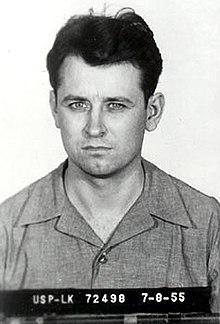
Back جيمس إرل راي Arabic জেমস আর্ল রে Bengali/Bangla James Earl Ray Catalan James Earl Ray Czech James Earl Ray Danish James Earl Ray German James Earl Ray Esperanto James Earl Ray Spanish James Earl Ray Estonian James Earl Ray Basque
James Earl Ray | |
|---|---|
 Mug shot of Ray taken on July 8, 1955 | |
| Born | March 10, 1928 Alton, Illinois, U.S. |
| Died | April 23, 1998 (aged 70) Nashville, Tennessee, U.S. |
| Known for | Being convicted for the assassination of Martin Luther King Jr. |
| Conviction(s) | First degree murder Armed robbery (4x) Mail fraud Burglary (2x) Passport fraud Escape (2x) |
| Criminal penalty | 100 years imprisonment[a] |
| Escaped | April 23, 1967–June 8, 1968 June 10–13, 1977 |
| Details | |
| Victims | Martin Luther King Jr., 39 |
| Date | April 4, 1968 |
James Earl Ray (March 10, 1928 – April 23, 1998) was an American fugitive who was convicted of the assassination of Martin Luther King Jr. at the Lorraine Motel in Memphis, Tennessee, on April 4, 1968. After the assassination, Ray fled to London and was captured there. Ray was convicted in 1969 after entering a guilty plea—thus forgoing a jury trial and the possibility of a death sentence—and was sentenced to 99 years of imprisonment.
In 1994, Loyd Jowers, the owner of a restaurant, publicly began claiming that he had been part of a conspiracy to assassinate King and that Ray was a scapegoat. In a Memphis civil trial in 1999, a jury unanimously concluded that Jowers was liable for the assassination, that King was the victim of a conspiracy, and that various United States governmental agencies had conspired to murder King and frame Ray for the assassination. The King family has consistently said that they believe Ray was innocent, though this conclusion was disputed by the United States Department of Justice in 2000.[1][2] The King family has stated that they believe the true murderer was a Memphis Police Department officer, Lieutenant Earl Clark.[3][4]
Cite error: There are <ref group=lower-alpha> tags or {{efn}} templates on this page, but the references will not show without a {{reflist|group=lower-alpha}} template or {{notelist}} template (see the help page).
- ^ Jackman, Tom (March 30, 2018). "Who killed Martin Luther King Jr.? His family believes James Earl Ray was framed". The Washington Post. Retrieved January 11, 2024.
- ^ Webb, Jon (April 6, 2018). "50 years later, conspiracies still swirl around Martin Luther King's death". Evansville Courier & Press. Evansville. Retrieved January 11, 2024.
- ^ "Assassination Conspiracy Trial". King Center for Nonviolent Social Change. Archived from the original on May 3, 2012.
- ^ "Assassination of Martin Luther King, Jr". The Martin Luther King, Jr., Research and Education Institute. April 24, 2017. Archived from the original on July 2, 2020. Retrieved August 16, 2024.